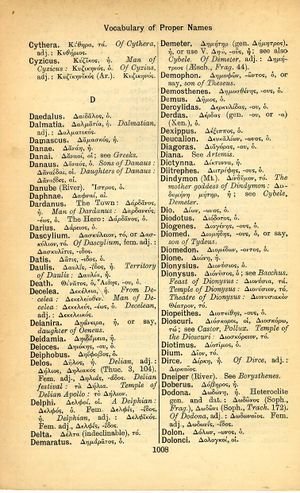Damascus
οὐκ ἔστι λέουσι καὶ ἀνδράσιν ὅρκια πιστά → there are no pacts between lions and men, between lions and men there are no oaths of faith, there can be no covenants between men and lions
English > Greek (Woodhouse)
Δαμασκός, ἡ.
Latin > English (Lewis & Short)
Dămascus: (-os, Luc 3, 215; cf. Prob. II. p. 1462
I fin. P., p. 121 Lindem.), i, f., Δαμασκός, Heb. Dammesek or Darmesek, the very ancient capital of Coelesyria, on the Chrysorrhoas, celebrated for its terebinths, and, since the time of the Emperor Diocletian, for its fabrics in steel, now Dameshk, Curt. 3, 12 sq.; Plin. 5, 18, 16, § 74; 13, 6, 12, § 54; Flor. 3, 5, 29; Stat. S. 1, 6, 14; Vulg. Gen. 14, 12.—Hence,
I Damascus, a, um, adj., of Damascus (eccl. Lat.), Vulg. Gen. 15, 2.—
II Dăma-scēnus, a, um, adj., of Damascus, Damascene: pruna, Plin. 15, 13, 12, § 43; Pall. Nov. 7, 16; Mart. 13, 29; cf. absol., id. 5, 18, 3 (Eng. damson); and pruna Damasci, Col. 10, 404.—
B Subst.:
1 DAMASCENVS, i, m.,
(a) a surname of Juppiter, Inscr. Grut. 20, 2.—
(b) Plur.: the people of Damascus, Vulg. 2 Cor. 11, 32.—
2 Dămascēna, ae, f. (sc. regio), the region about Damascus, Plin. 5, 12, 13, § 66; in the Greek form Damascene, Mel. 1, 11, 1.
Latin > French (Gaffiot 2016)
Dămascus,¹³ ī, f. (Δαμασκός), Damas capitale de la Cœlé-Syrie : Plin. 5, 74 || -us, a, um, de Damas : Vulg. Gen. 15, 2.

